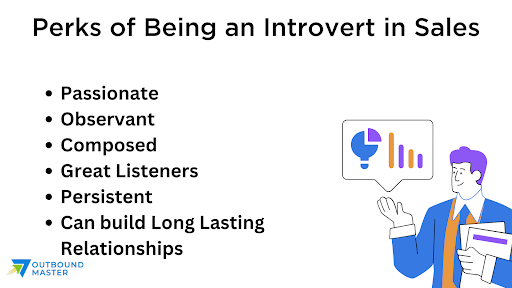How to Thrive as an Introverted Salesman: 10 Tips
Many people assume that a successful salesperson must be an outgoing,
gregarious extrovert. However, introverts can also excel in sales by focusing on their natural talents for preparation, listening, and building meaningful relationships. This comprehensive guide provides actionable tips to help introverted professionals maximize their strengths in sales roles.
| Tip | Why It Works | Action Steps | Resources |
| 1. Leverage listening skills | Focuses on your strength for active listening and understanding client needs | Take notes, ask thoughtful follow-up questions, summarize and validate key points | Audiobooks on active listening skills |
| 2. Prepare and practice | Reduces social anxiety by making you feel confident and in control | Research prospects, draft consultative questions, rehearse pitch | Sales roleplaying workshops |
| 3. Quality over quantity | Allows you to dedicate time to meaningful interactions | Conduct fewer but more strategic meetings per day, following 80/20 rule | Time management apps like Toggl |
| 4. Written communication | Plays to your strengths with the written word for follow-ups | Email recaps, provide extra resources, use chat tools | Email templates and cadences |
| 5. Digital tools | Enables you to build connections online comfortably | Leverage CRM, social media, virtual events and webinars | Sales tech blogs like Sales Hacker |
| 6. Optimal environment | Sets you up for success by reducing distractions | Meet in private rooms, adjust lighting and seating | Books on eliminating office distractions |
| 7. Selective networking | Focuses on niche events aligned with your goals | Connect online first, set conversation goals | Introvert networking guides |
| 8. Build relationships | Aligns with your ability to nurture long-term connections | Focus on trust-building and consistency | Books on authentic relationships |
| 9. Set goals | Provides structure and a sense of control | Define sales and self-development goals, celebrate progress | Goal-setting worksheets and apps |
| 10. Continual improvement | Leverages your dedication and self-reflection | Seek feedback, take sales skills training | eLearning platforms like LinkedIn Learning |

1. Leverage Your Active Listening Skills
One of the most powerful skills introverts bring to sales is their innate ability to listen deeply to client needs. Studies consistently show that introverted salespeople tend to outperform their extroverted counterparts, simply by leveraging their active listening abilities. Here are some ways to tap into this strength:
- Give clients your full attention without interrupting or imposing your perspectives. Let them speak freely and share their thoughts, concerns, and pain points. Resist the urge to jump in before fully grasping their needs.
- Ask thoughtful follow-up questions to draw out more details. Phrases like “Could you tell me more about that?” or “What have you tried to address that challenge so far?” demonstrate engagement while uncovering deeper insights.
- Paraphrase back what you heard to confirm your understanding. Summarize the key issues and objectives to clarify you have captured the full context. This validation builds trust.
- Provide solutions tailored specifically to what you heard. Recommend offerings, services, or products that directly address the root problems or needs voiced by the client, rather than a generic pitch.
When introverts commit to deep active listening, they gain invaluable insights that allow them to tailor solutions perfectly matched to each client’s unique needs and perspectives. This level of customization and thoughtfulness simply isn’t possible without leveraging listening as an introvert’s superpower in sales.
2. Thoroughly Prepare and Practice Your Approach

Preparation and practice are key to reducing social anxiety and boosting confidence for introverts in client-facing sales roles. It’s simple – the more prepared you are for meetings and calls, the less stressed you will feel interacting with prospects.
- Research each client and account thoroughly beforehand. Learn about their company, industry, pain points, and objectives. Use tools like LinkedIn and social media to understand their business priorities.
- Plan consultative questions to guide conversations. Draft an outline of thoughtful questions to draw out pain points and keep the dialogue focused on the client’s needs.
- Practice your pitch and talking points. Rehearse presentations or sales conversations with colleagues to polish your delivery and flow.
- Visualize successful outcomes. Envision yourself competently engaging clients with confidence to program your brain for success.
According to studies, introverts who leverage preparation to tailor their approach excel in sales roles. Do your homework to reduce stress and maximize your natural talents during client interactions.
3. Prioritize Quality Conversations over Quantity
Trying to cram as many sales calls and meetings as possible into every day can quickly lead to burnout for introverts. Rather than focusing solely on quantity, direct your energy into having meaningful, purpose-driven conversations.
- Conduct fewer, but more strategic prospect meetings per day. Give yourself adequate time and energy to have focused conversations that build connections.
- View sales as a long-term process, not a same-day transaction. Your goal is to provide value and nurture lasting relationships over time.
- Listen more than you pitch. Ask questions to understand needs, then customize your pitch accordingly rather than reciting the same generic script to every prospect.
- Follow the 80/20 rule. Target the 20% of leads most likely to convert rather than spreading yourself thin across lower-quality prospects.
Research confirms that introverts excel in sales roles by prioritizing quality, one-on-one customer relationships over high-volume activity. Depth of interactions will always win out over breadth.
4. Leverage Your Written Communication Skills
While in-person meetings can be draining at times, introverts often thrive when using written communication like emails, chat tools, and texts for sales conversations.
- Follow up after sales calls or meetings via email. Thank the prospect for their time, and recap the next steps to reinforce key points.
- Provide additional resources and materials through email to continue nurturing the lead without having to meet again right away.
- Use tools like chat functions or messaging platforms to qualify and engage leads in real time through written channels.
- Opt for written communication when possible to reduce social exhaustion related to constant calls or meetings.
Studies show introverts can excel in sales by leveraging their natural written communication skills to deliver thoughtful and engaging follow-ups. Play to your strengths in this area.
5. Embrace Digital Tools and Social Selling
A wide array of digital tools exist to help sales professionals build connections and nurture leads without relying solely on real-time interactions. Introverts can optimize sales success by fully utilizing:
- CRM software to manage databases of prospects and automate personalized outreach campaigns.
- Social media platforms like LinkedIn to research leads, join industry conversations, and establish thought leadership.
- Webinars and virtual events to generate leads and build professional connections from behind a screen.
- Sales enablement tools that provide video conferencing, email templates, sales playbooks, and more.
By proactively incorporating digital solutions into their sales process, introverts can benefit from lower-pressure ways to understand prospects and guide them through the sales journey. The technology is there – use it fully to your advantage.
6. Create an Optimal Sales Environment
While introverts may not be able to fully control where sales meetings take place, some adjustments can be made to create comfortable environments that bring out their best performance.
- When possible, meet clients in private conference rooms or offices to minimize visual and auditory distractions.
- Set expectations on meeting length and topics so no surprises are added to the discomfort.
- Request seating arrangements where clients are not directly facing you, which can feel intensely distracting for introverts.
- Play soft background music and ensure the lighting is not harsh or noisy.
- Have water available during meetings to maintain composure and reduce tension when talking at length.
Even small tweaks like these allow introverts to feel focused and at ease during sales meetings, enabling them to leverage their full talents. Don’t underestimate the impact on the environment.
7. Approach Networking Selectively
Networking is a critical sales skill for prospecting, but informal professional mixers are many introverts’ worst nightmare. The key is to be highly selective in choosing networking approaches that work with your preferences.
- Start by networking virtually using online groups and forums to establish connections before meeting in person.
- Attend niche industry events focused on your target customers versus massive generic conferences.
- Set a goal to have a few meaningful conversations rather than trying to work the entire room, which can feel overwhelming.
- Follow up to continue nurturing promising connections after events, rather than relying solely on real-time interactions.
By adapting traditional networking best practices to their strengths, introverts can tap into the power of connections without burning out on constant social stimulation. Be selective about networking smartly.
8. Develop Authentic, Long-Term Client Relationships
Ultimately, sales comes down to building authentic, human relationships founded on trust and reliability. This happens to align seamlessly with introverts’ natural talents.
- Focus on trust-building by under-promising and over-delivering to demonstrate you keep your word.
- Be consistent and dependable with follow-through to establish reliability with clients.
- Check in periodically to nurture the relationship, so clients view you as an advisor rather than just a sales rep.
- Take a genuine interest in the client’s needs and success, not just closing the next deal.
By developing real relationships with clients over months and years, introverts are well-equipped to earn repeat business and referrals. This pays off far more than high-pressure pushiness.
9. Set Goals and Celebrate Small Wins
Working towards clear, measurable goals provides introverts with a sense of purpose and control in an otherwise chaotic sales role. Take time to acknowledge progress through small celebrations.
- Set weekly prospect outreach targets and take yourself to lunch when you meet them.
- Note monthly achievements like landing a new enterprise client and reward the win with a Friday afternoon off.
- Track indicators of progress like referral rates, pipeline growth, and closed revenue to motivate continual improvement.
- Celebrate non-sales victories too like giving a successful product demo or nailing an outbound call.
Goal setting and celebrating small milestones create positive reinforcement that will boost motivation and performance for introverts in sales.
10. Continually Improve Through Self-Reflection
Finally, introverts naturally excel when they commit to ongoing learning and professional development to boost their sales abilities.
- Ask managers or mentors for regular feedback on areas of strengths and areas for growth. Actively apply their advice.
- Read sales books and blogs to constantly build your skills in areas like objection handling, relationship building, storytelling, etc.
- Take online courses or workshops through associations like Salesforce to expand your sales toolkit.
- Listen to sales podcasts during your commute to inoculate yourself with valuable insights.
- Reflect after each week on lessons learned, wins to celebrate, and goals for the coming week.
By embracing constant self-improvement through continual learning, introspective feedback, and a growth mindset, introverts equip themselves with an ever-expanding set of sales skills to thrive in their careers.
Conclusion
Sales success requires playing to your natural strengths. For introverts, that means tapping into talents for preparation, listening, writing, and slowly building meaningful relationships. By focusing on quality over quantity and leveraging tools that allow you to work remotely at times, introverts can thrive in sales.
Remember, you have unique gifts that make you perfectly suited for sales success. Commit to continuous improvement and be confident in your preparation. With these tips, you can build a rewarding career in sales as an introvert.
Frequently Asked Questions
Can introverts thrive in sales as much as extroverts?
Absolutely. While extroverts gain energy from social interactions, introverts extract energy from preparation and focused conversations. By leveraging their natural talents for listening, writing, and building relationships, introverts can find great success in sales. The key is knowing yourself and intentionally nurturing your strengths.
How should introverts handle rejection from prospects without taking it personally?
Rejection stings no matter how you slice it. But remember that a “no” typically says more about timing or external factors than it does about you. Focus on what you can control, like your preparation and persistence. Having structured follow-up processes also helps take emotion out of the equation when prospects say no. And don’t forget to celebrate little wins along the way.
What are some networking tips specifically suited for introverts in sales roles?
Start by networking online first, getting to know prospects through digital channels before meeting in person. When attending live networking events, set a goal to have a few meaningful conversations rather than trying to meet everyone in the room. Follow up after events to strengthen promising connections without relying solely on in-the-moment interactions. Remember, introverts build relationships slowly over time, so don’t get discouraged if networking feels challenging at first.



